Metal Detecting in the Rain: Pros, Cons, and Tips for Success

Written by Piotr Lesniewski
Detectorist • Scotland
As an Amazon Associate we earn commission from qualifying purchases. Read our full Affiliate Disclosure.
When you’re itching to hunt for treasure but dark clouds loom overhead, that rain doesn’t have to dampen your metal detecting plans.
Most modern metal detectors can handle wet conditions if properly protected, and some enthusiasts even prefer detecting after rainfall. The moisture actually enhances conductivity in the soil, potentially improving your signal depth and clarity.
But before you head out into the downpour, you’ll need to understand a few critical factors that separate successful rain sessions from expensive equipment failures.
Key Takeaways
- Yes, you can metal detect in the rain, as many modern metal detectors are designed to be water-resistant or waterproof, allowing them to function in wet conditions.
- Most metal detectors can be used in rain with waterproof coils, but control boxes need protection with covers or plastic bags.
- Reduce sensitivity settings in wet conditions to filter out false signals that may be amplified by moisture.
- Wet ground actually enhances detection depth and signal clarity, making it easier to distinguish valuable items.
- Rain creates softer soil for easier digging and can reveal previously hidden treasures due to landscape changes.
Can You Use A Metal Detect In The Rain?
Yes, you can often metal detect in the rain, as many modern metal detectors are designed with weather-resistant or waterproof coils and control housings, allowing them to withstand moisture. Light to moderate rain is generally not an issue for the functionality of these detectors, and some detectorists even prefer a bit of moisture as it can sometimes improve ground conductivity, potentially aiding in the detection of deeper targets.
However, it’s always crucial to check your specific metal detector’s manual for its water resistance rating to avoid damaging the equipment, and to ensure your own comfort and safety in wet conditions.
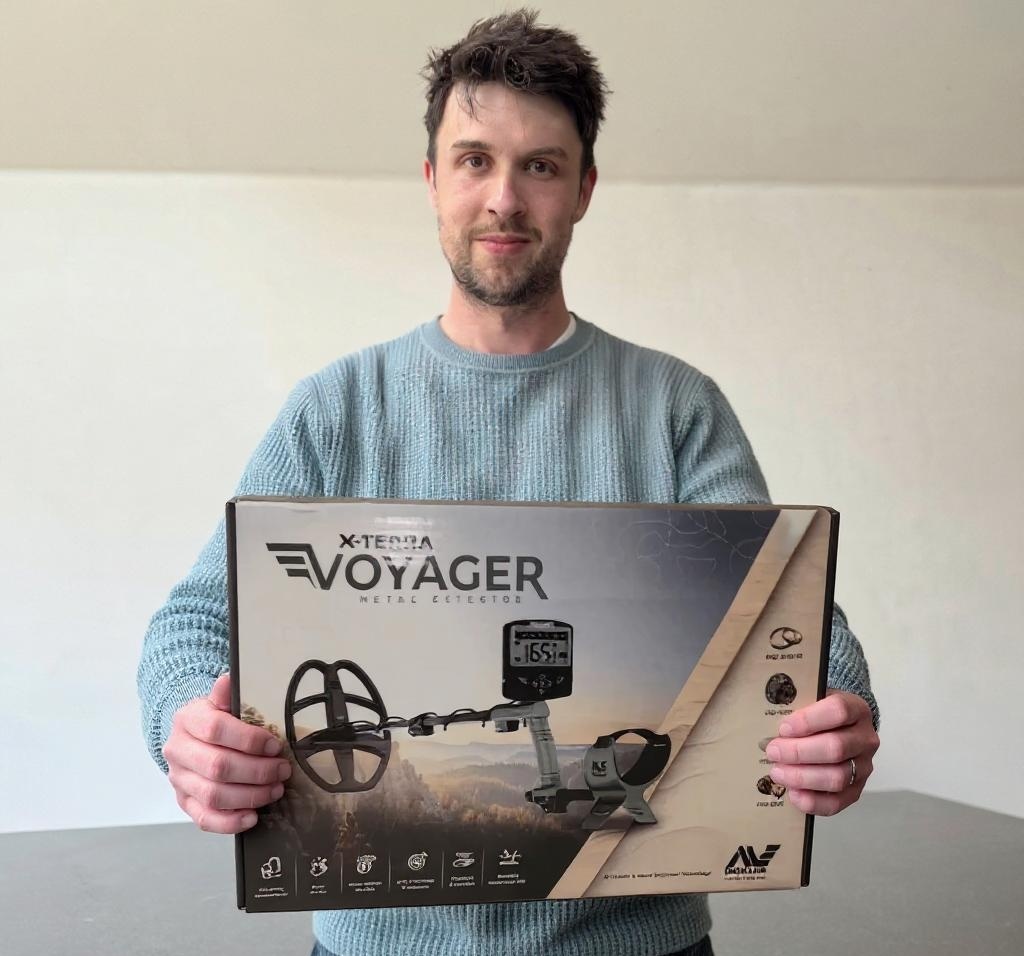
Functionality of Metal Detectors in Wet Conditions
Most metal detectors feature waterproof coils that can function effectively in rain, but you’ll need to ensure your control box has adequate protection.
You can use rain covers or plastic bags to shield non-waterproof components from moisture damage.
Specific models like the Minelab Equinox series come fully waterproof, allowing you to detect in heavy rain without concerns.
Waterproof Coils
A key feature of beginner metal detectors is their waterproof search coils, which are specifically designed to function in wet environments.
These specialized components allow you to sweep across damp grass, shallow puddles, and even shorelines without damaging your equipment.
When you’re caught in unexpected rainfall, you don’t need to immediately pack up your detecting gear.
The search coil—the disc-shaped part that you pass over the ground—can handle direct exposure to water without compromising performance or suffering electrical damage.
This waterproofing means you can confidently continue your hunt in light rain or scan wet sand after a storm has passed.
However, it’s important to remember that while the coil may be waterproof, other parts of your detector mightn’t share this protection.
Control Box Protection
Unlike waterproof coils, control boxes present the greatest vulnerability when metal detecting in rainy conditions. Many metal detectors feature waterproof coils but lack fully waterproof control boxes where the electronics and screen are housed. This critical distinction means your detector’s most sensitive components remain at risk during rainfall.
If you’re serious about detecting in wet weather, you have two main options. First, consider investing in a fully waterproof metal detector designed specifically for all-weather use.
Alternatively, protect your existing detector’s control box with a dedicated waterproof cover.
Many detectorists opt for budget-friendly solutions – simple cling film wrapped carefully around the control box can provide effective temporary protection.
Whatever method you choose, never underestimate the importance of keeping your detector’s electronic brain dry during rainy detecting sessions.
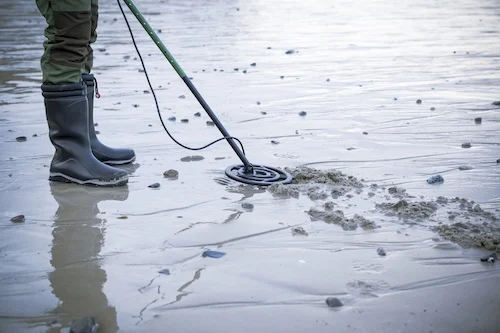
Model Specifics
Different metal detector models perform distinctly when exposed to rain and moisture. The price and quality of your device significantly impact its reliability in wet conditions.
Lower-end detectors often struggle in rain or mist, generating false signals that can frustrate your hunting experience. These budget models may interpret water droplets as metal targets, leading to wasted time digging empty holes.
In contrast, premium professional metal detectors incorporate advanced discrimination technology that better distinguishes between actual targets and environmental interference.
Many high-end models feature specialized rain modes or moisture filters that maintain accurate detection despite challenging weather.
Before selecting a detector for wet environments, research specific models known for wet weather performance. Manufacturers typically rate their detectors’ weather resistance capabilities, which can guide your purchase decision if you frequently detect in rainy conditions.

Advantages of Metal Detecting in the Rain (or when the ground is wet)
Metal detecting in rainy conditions offers surprising benefits you’ll appreciate once you try it.
Wet ground conducts electricity better, allowing for increased detection depth, clearer signals, and easier digging of the softened soil.
The rain also keeps crowds away and can reveal previously hidden treasures as landscape changes occur with water runoff.
Increased Detection Depth
When the rain soaks into the earth, it creates an ideal condition that can significantly boost your metal detector’s performance. This happens because moisture in the soil increases its conductivity, allowing your detector’s electromagnetic field to penetrate deeper than in dry conditions.
The science behind how a metal detector works is straightforward – water reduces the resistance in the soil, enabling the detector’s signals to travel farther before dissipating. This means you’ll be able to discover targets that might otherwise remain hidden in dry conditions.
Many experienced detectorists specifically plan their hunts after rainfall to take advantage of this natural depth enhancement.
You’ll likely notice targets appearing at greater depths on your detector’s display, giving you access to deeper, potentially undiscovered finds that others may have missed.
Clearer Signals
Why do seasoned detectorists often praise wet conditions?
It’s because moisture in the ground can dramatically improve signal clarity. When soil contains moisture, the electromagnetic field from your detector interacts differently with buried metals, creating a more pronounced contrast between targets and surrounding soil.
You’ll notice that target signals “pop” more distinctly in wet ground, making it easier to differentiate valuable finds from trash. This enhanced signal definition allows you to make better discrimination decisions and can significantly reduce the frustration of digging false positives.
The improved conductivity of damp soil essentially creates a better medium for your detector’s signals to work through, resulting in cleaner, more defined audio responses.
This clarity advantage means you can hunt with greater confidence and potentially identify good targets that might be muddled or missed in dry conditions.
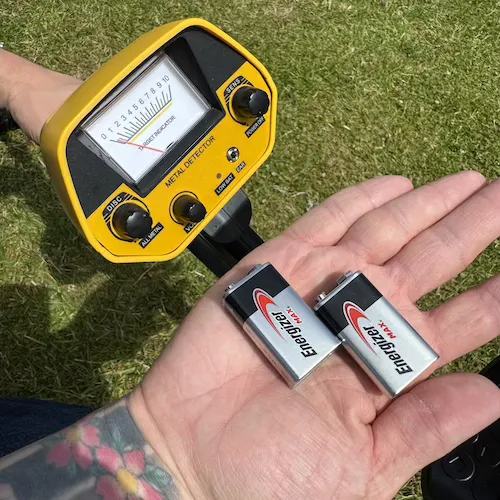
Easier Digging
One of the most practical benefits of detecting after rainfall is the transformation of the ground beneath your feet. When soil absorbs moisture, it becomes significantly more manageable to dig through compared to its dry, compacted state. This means you’ll expend less energy and time retrieving potential treasures.
The rain softens the earth, allowing your digging tools to penetrate more easily. You’ll notice the difference immediately—your shovel or trowel slides into wet ground with minimal resistance, whereas dry soil often requires considerable force.
This efficiency not only speeds up your recovery process but also reduces strain on your hands, wrists, and back. For detectorists who spend hours in the field, this advantage can’t be overstated. The easier digging conditions mean you can investigate more signals in less time.
Fewer People
Beyond the physical benefits of working with softer soil, rainy days offer a strategic advantage that many seasoned detectorists cherish: privacy.
When you’re hunting in the rain, you’ll notice something immediately – you’ve got most sites to yourself. The casual detectorists and weekend warriors typically stay home when the skies open up, leaving prime locations uncrowded and unexplored.
This solitude isn’t just about comfort; it’s about opportunity. Popular parks, beaches, and historical sites that might be swarming with competition on sunny days become your exclusive hunting grounds during a downpour.
You’ll also face fewer interruptions from curious onlookers asking questions about your finds or equipment. This means more concentrated search time and the freedom to thoroughly investigate promising signals without distractions.
Landscape Changes
Rain transforms the very terrain you’re searching, creating unique opportunities that fair-weather detectorists often miss.
When heavy downpours sweep across beaches, riverbanks, and open fields, they initiate significant erosion processes that can work in your favor.
As rainwater carves through the soil, it strips away layers of earth that might’ve concealed valuable targets for months or even years. This natural excavation brings previously buried objects closer to the surface—sometimes directly into your detection range. Items that were once too deep for your detector’s reach suddenly become accessible.
The most dramatic landscape changes occur on slopes, coastal areas, and recently plowed fields where water flow is substantial.
After a good rain, you’ll often find freshly exposed items in areas where soil has been washed away, presenting prime hunting grounds for your next detection adventure.
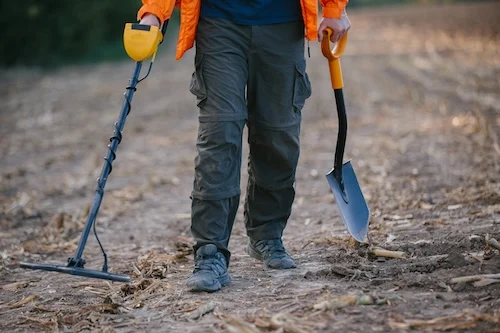
Disadvantages and Considerations for Metal Detecting in the Rain
While metal detecting in the rain offers benefits, you’ll face several challenges like personal discomfort from getting soaked and navigating muddy terrain that can make digging difficult.
Your equipment requires proper waterproofing to prevent damage, and wet conditions might trigger more false signals depending on your detector’s sensitivity.
The type of soil you’re searching also impacts your experience, as clay becomes sticky and unworkable while sandy areas may drain better but still present their own complications.
Personal Comfort
Despite your enthusiasm for finding buried treasures, spending hours in wet weather can significantly diminish your metal detecting experience.
Getting wet and cold quickly turns an exciting hunt into an uncomfortable ordeal, especially when rain soaks through your clothing and chills your body.
You’ll find your focus shifting from scanning the ground to thinking about getting dry and warm. Even with waterproof gear, extended exposure to rain can leave you feeling damp and miserable.
Your hands may become cold and less dexterous, making it difficult to operate your detector’s controls or dig properly.
Consider bringing extra layers, waterproof gloves, and perhaps a portable shelter for breaks.
Remember that personal comfort directly impacts your stamina and ability to remain in the field—an uncomfortable detectorist is likely to cut their hunt short.
Muddy Conditions
Heavy rainfall transforms detecting sites into muddy quagmires that create numerous challenges for metal detectorists.
Mud clings to your equipment, adding weight and making each sweep more laborious. Your detector’s coil can quickly become caked with mud, potentially reducing its sensitivity and detection depth.
Recovering targets becomes significantly more difficult as holes fill with water and mud slides back into your dig spots. You’ll find yourself spending more time cleaning finds on-site before you can properly identify them.
Muddy conditions also increase the risk of losing smaller items in the muck during recovery.
Additionally, you’ll leave more noticeable holes and disturbances behind, which isn’t good detecting etiquette. When possible, it’s often better to wait for the ground to dry slightly before tackling heavily saturated areas.
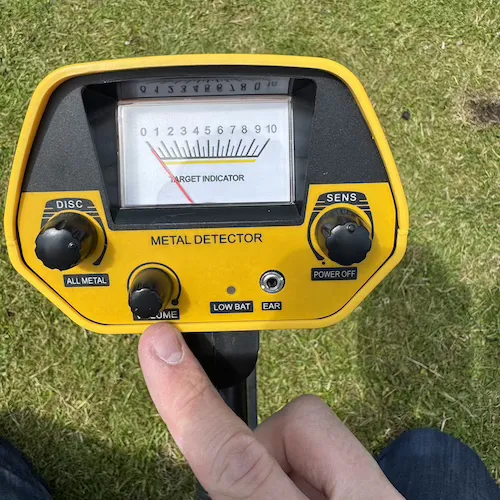
Equipment Protection
Protecting your metal detector from rainfall demands serious consideration before heading out in wet weather. Most entry-level detectors aren’t fully waterproof, only water-resistant, meaning they can handle light rain but not submersion or heavy downpours.
Invest in specialized rain covers designed for your detector model, focusing on protecting the control box where sensitive electronics reside.
Plastic bags secured with rubber bands offer a quick budget solution in emergencies, but don’t provide reliable long-term protection.
Consider using waterproof headphones or covers for standard ones, as water damage to audio components is common.
Additionally, carry microfiber cloths to wipe down equipment periodically during your hunt.
When you return home, thoroughly dry all components before storage to prevent corrosion, particularly on battery contacts and connection points.
Increased Junk Signals (Potentially)
Two significant challenges emerge when metal detecting in rainy conditions: amplified junk signals and compromised discrimination capabilities.
While moisture can enhance signal response for valuable targets, it unfortunately does the same for unwanted iron and trash items you’d normally ignore.
Your detector’s discriminator—the feature that helps you filter out junk—may struggle in heavily saturated ground. This means you’ll likely dig more false positives than usual, potentially turning an enjoyable hunt into a frustrating experience of repeatedly unearthing nails, pull tabs, and other metallic refuse.
For best results in wet conditions, you might need to adjust your expectations and detector settings. Be prepared for more digging and remember that the trade-off of increased sensitivity might be worth it when you uncover that rain-enhanced target signal.
Soil Type Matters
Different soil compositions react uniquely to rainfall, dramatically altering your metal detecting experience.
When hunting in highly mineralized soil after rain, you’ll likely face reduced detection depth and less reliable target identification. The moisture activates iron components in mineral-rich dirt, essentially creating a shield that hampers your detector’s performance.
Conversely, if you’re detecting in low-mineral soil, a good rainfall might actually improve your results. The moisture can enhance conductivity in these environments, potentially increasing your detection depth. This explains why some detectorists report better finds after rain while others experience frustration.
Before heading out after a downpour, consider your local soil composition. You’ll save time and disappointment by understanding how your specific hunting grounds respond to moisture and adjusting your ground balance accordingly.
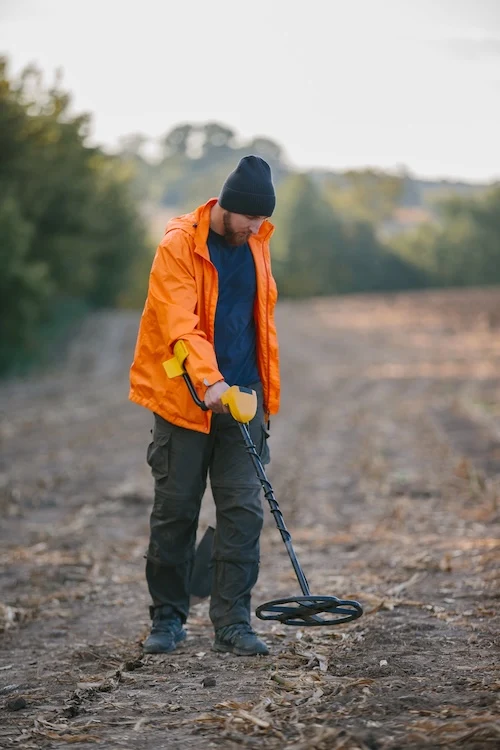
False Signals
Rain can set off numerous false signals on your metal detector, especially with entry-level models. When moisture saturates the ground, your detector may struggle to distinguish between worthwhile targets and the conductivity of wet soil itself.
This frustrating phenomenon can leave you digging empty holes and wasting valuable hunting time.
If you’re using a lower-end detector in wet conditions, consider reducing your sensitivity settings. While this might limit your depth detection somewhat, it will help filter out many of the false positives caused by rain.
Some detectors include specialized rain modes or ground balance features specifically designed to compensate for wet conditions.
Remember that false signals tend to increase dramatically during active rainfall, so detecting immediately after rain rather than during a downpour can provide a better balance between moisture benefits and signal accuracy.
Conclusion
You’ll discover that rainy-day detecting is possible with the right equipment and precautions. While you’re likely to experience enhanced detection depth in wet soil, don’t forget to protect your control box and expect some additional false signals. Your comfort matters too, so dress appropriately. With waterproof coils and proper settings, you’ll find that rain won’t stop your treasure hunting adventures—it might even improve them!
Author Profile

Piotr Lesniewski
"Digging up the past, one signal at a time."
Polish-born, Scotland-based, and obsessed with the beep. My passion began decades ago, exploring fields with my Dziadek (grandfather). Now, with over 10 years of digging under my belt, I'm here to share everything I've learned—unfiltered and unbiased—to help you unearth your own piece of history. No sales pitches, just real field experience.